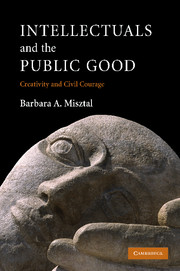Book contents
- Frontmatter
- Contents
- List of tables
- Acknowledgements
- Introduction
- Part I Theoretical framework
- Part II Public intellectuals: the case of the Nobel Peace Prize laureates
- 5 Intellectuals for peace
- 6 Heroes: legends in their own time
- 7 Dissidents: peaceful rebels
- 8 Champions: promoting the cause
- 9 Pioneers: bringing science to politics
- Conclusion
- References
- Index
6 - Heroes: legends in their own time
Published online by Cambridge University Press: 22 September 2009
- Frontmatter
- Contents
- List of tables
- Acknowledgements
- Introduction
- Part I Theoretical framework
- Part II Public intellectuals: the case of the Nobel Peace Prize laureates
- 5 Intellectuals for peace
- 6 Heroes: legends in their own time
- 7 Dissidents: peaceful rebels
- 8 Champions: promoting the cause
- 9 Pioneers: bringing science to politics
- Conclusion
- References
- Index
Summary
Realistic idealists
The notion of heroism, although frequently used, is rather ambiguous. This ambiguity is a result of the fact that different traditions emphasise different characteristics of a hero. In ancient Greece heroes were figures of divine descent, endowed with great physical and moral strength. For example, the heroes of Homer's Iliad and Odyssey were strong and beautiful aristocratic warriors, borne to the supreme heights of their deeds by a surge of power infused into them by the gods themselves. The Christian tradition altered this concept, replacing prowess and honour with spiritual purity. Now we think about heroes not as mythological figures or brave warriors but, rather, as men and women who exhibit great courage and exceptional qualities in pursuing noble causes.
This ambiguity regarding the notion of heroism allows it to be put to the service of various values and different causes, which, in turn, further complicates its meaning. Heroic virtues can, for example, be appropriated by propaganda and made to serve nationalistic interests. Thus, in authoritarian regimes ‘heroism’, basically, means a willingness to march in rank and be a soldier. Democracies, on the other hand, tend to have problems with heroes, as they cultivate suspicions about any worshipping of the kind of overwhelming brilliance displayed by great people.
- Type
- Chapter
- Information
- Intellectuals and the Public GoodCreativity and Civil Courage, pp. 125 - 152Publisher: Cambridge University PressPrint publication year: 2007



